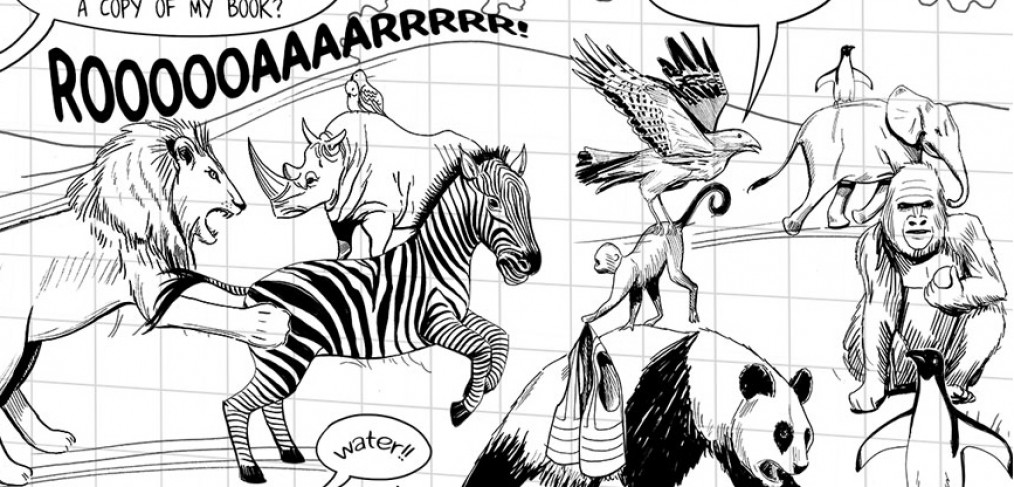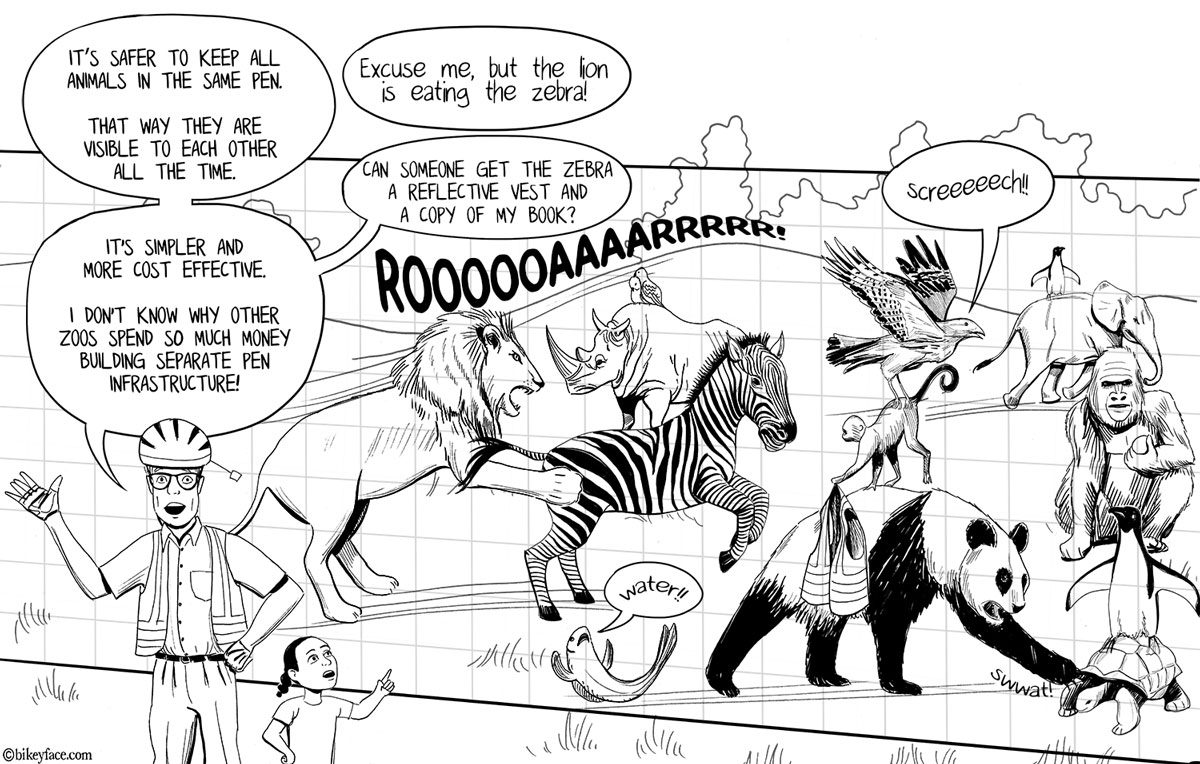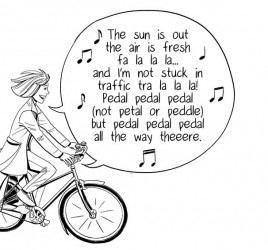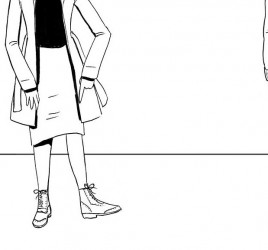
A Zoo
I have to bicycle vehicularly most of the time because there’s not much infrastructure yet. But I’d prefer not to. What I can’t understand why anyone would argue against protected bike lanes.
I wonder how the argument would go if applied to other things- like a zoo?





So it is actually true, motorists really want to kill cyclists?
“So it is actually true, motorists really want to kill cyclists?”
Motorists want to get where they want to be as fast as possible (also, to work out various anger issues and other psychological things they may have going on, but that’s a side-issue – though a small but hugely important proportion do seem to be actual psychopaths).
Clearly, if they can get somewhere faster by imposing a greater risk of death on cyclists (and anyone else outside the vehicle not directly related to them) they will do so.
Does this really need to be explained though? I can’t figure out what point you are making.
As someone that barely survived a deliberate motorist attack, YEP! They do. Fortunately it is only a small minority, about the same as the minority of gun owners that want to go kill people at random (and if I may say so I think the Venn diagram of the two sets would be a nearly perfect overlay, with the only difference being the gun owners that didn’t drive and the drivers that didn’t own a gun).
“So it is actually true, motorists really want to kill cyclists?”
Going by British experience, most clearly don’t – though there are occasional cases of drivers using their vehicle against cyclists with overtly murderous intent.
The collective attitude of UK motorists is rather one of casual indifference: indivdually, they don’t want to kill cyclists, and would be mortified if they did. But collectively the sentiment is that cyclists are behaving recklessly by being on the road at all, getting in the way of the motor traffic so vital to the national economy, so if one of them ends up badly injured or dead from time to time it’s regrettable but sadly inevitable.
The police, the law courts and jury members in Britain take a quite shamefully indulgent view of motorists knocking over cyclists: a sort of there-but-for-the-grace-of- God-go-I attitude and it could have happened to any of us. Scarcely a week goes by without a driver who has just killed or badly injured a cyclist through culpable negligence being let off with a derisory fine and perhaps a six-month suspension of their licence for behaviour which here in France would earn them a prison term and a lifelong driving ban. And public spokesman like the odious Jeremy Clarkson regularly crack jokes about knocking over cyclists, to the delight of their millions of dim-witted followers. No amount of education and awareness-raising is ever going to change attitudes like that: just give me a nice slab of concrete between me and them.
The exact analogy has occured to me many times, but not so much in relation to “vehicular cycling”, rather when arguing with the ‘shared space’ true-believers (a different, and to my mind, more egregiously wrong, type).
I understand that London Zoo now takes a segregationist approach to the interaction between the visiting public and lions. In the beginning the Zoo’s policy was shared-use: that lions and visitors were encouraged to mingle freely, with blue strips painted on the ground marked “Human Beings Only” and “Strictly No Lions”. That didn’t work very well, despite the Zoo running a publicity campaign urging visitors to wear Kevlar and chain-mail overalls and holding them legally responsible if they didn’t and received a good mauling. Likewise, lions are good at killing things but pretty crap as regards literacy; so despite the notices and the Kevlar overalls quite a lot of people who came to the Zoo never left it except as a bucketful of lion-dung. After that they tried educating the lions and the public on their respective responsibilities: that the lions mustn’t kill people and eat them, and the public ought to avoid provoking the lions by…er…being there at all. A chap in America wrote a very popular book called Leonine Walking and later one called Lioncraft: Or How to Get in Touch with Your Inner Lion, arguing that the way to do it was for the visitors to stop cowering and running for their lives whenever a lion confronted them, but instead assert themselves, face up to the beast, roar, walk like a lion and generally let the animal know that human beings are mammals as well, carnivorous (a bit) and with teeth and claws too even if those aren’t nearly as impressive. Its followers undeniably worked hard on it, lounging around all day yawning and licking their testicles insofar as they could reach them, and occasionally going out in a gang to chase and kill one of the smaller gazelles if they could catch it. They even took to mocking the more timorous Zoo visitors as “Over-the-Fence Bunnies” if they ran for cover when they met a hungry lioness .But sadly, whenever they came up against a lion they tended to come off markedly worst, many getting eaten or requiring extensive reconstructive surgery (…which, the survivors argued, was merely because they weren’t doing it properly and hadn’t read Lioncraft in the correct spirit).
So in the end London Zoo’s trustees, fed up with constant peevish whingeing from parents who’d just seen their children devoured before their eyes, did the obvious, and regretfully installed stout metal grilles and deep concrete ditches between the public and the lions. It really surprises you that they took so long to see the need. But in one important respect humans aren’t like lions at all: they can talk and they can read and they can elaborate theories. And they have a fatal tendency to go on believing those theories despite overwhelming evidence to the contrary.